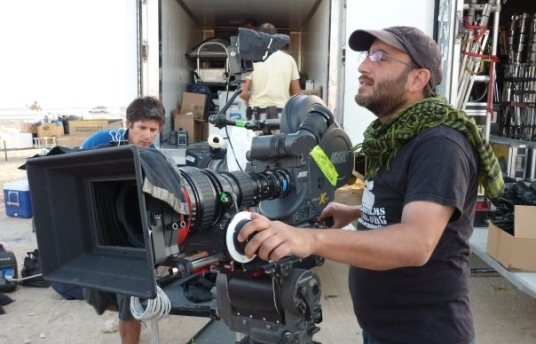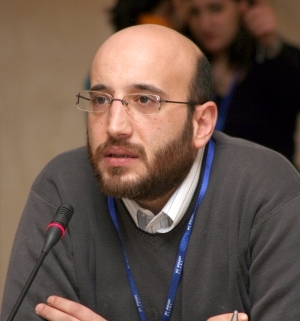People in Film: Mohamad Hachem
Mar 16, 2011

What does it take to work in ‘the business’? Mohamad Hachem, founder and director of ‘DocuDays: The Beirut International Documentary Festival’, tells DFI how he started in the business, what he does, and what he sees as the future for filmmaking in the Arab world.
Mohamad Hachem is the founder and director of ‘DocuDays: The Beirut International Documentary Festival’, which aims to promote Arab cinema on an international scale and is now in its 10th year. He launched the ‘Beirut Documentary Encounter’ and ‘Beirut Documentary Forum’, which run parallel to ‘DocuDays’, and is in the process of creating the ‘Arab Documentary Network’, an online portal which aims to serve the Arab documentary community by creating an online network for films, filmmakers and film professionals.

Mohamad Hachem
DFI: Mohamad, thank you for speaking to DFI. You’ve worked for years to develop and promote documentary filmmaking. Can you tell us how you got started in this field?
MH: I started as a graphic designer and animator before heading the creative department at a local Arab TV station. I moved on to directing documentaries that were broadcast on local and Arab channels, before working as a senior editor and a producer/director on feature stories for Arab TV stations. I also helped to launch the Al-Jazeera Documentary Festival in Qatar in 2005 as Senior Consultant. In addition, I have given several courses on the art and science of documentary production for young filmmakers, as well as several lectures on Arab documentary making.
DFI: Can you give us a brief description of what you do now?
MH: I am currently based here in Doha, Qatar, and since 1999 I have been managing ‘SOLOfilms’, a company specialized in producing television and corporate documentaries in and about the Arab world, from our offices in Doha and Beirut.
DFI: Tell us a little about ‘DocuDays: The Beirut International Documentary Festival’, the ‘Beirut Documentary Encounter’ and the ‘Beirut Documentary Forum’ – what do they encompass, and how do they differ?
MH: As you know, ‘DocuDays: The Beirut International Documentary Festival’ promotes Arab cinema internationally and has grown significantly since its inception 10 years ago, while both the ‘Beirut Documentary Encounter’ and ‘Beirut Documentary Forum’ complement each other. All are dedicated to the non-fiction genre. The ‘Encounter’ is more a melting pot for people with ideas, such as filmmakers and producers, to meet with other people in the industry, for example those with funding. The ‘Forum’, meanwhile, is more theoretical, and is aimed at both the study of and the contribution to the advancement of the industry in the region.
DFI: What are you working on right now, and can you tell us a little about it?
MH: In addition to a number of corporate films I am directing now, I am in the pre-production phase for a feature length documentary, nicknamed ‘BOA’. The film starts with a historical event and builds onto it by studying the socio-economical status of our world today. It all started with research I conducted to track the sources behind a song I’d heard. From listening to the lyrics, I found myself digging more and more into the necessity of possession and the meaning of social and economical justice.
DFI: Sounds interesting! Who is involved in the project, and where and when can we expect to see it?
MH: I am directing this project, my sister and colleague Abir is the producer, and the star is the story and the people behind it! It will be filmed between Lebanon and the United States, with minor shoots in Slovenia, Venezuela and Egypt. The initial production phase will start this summer and take almost one year, while post-production will start in 2012, which should take about six months. We are planning to start promoting it before the end of 2012.
DFI: How do you think filmmaking has developed since you started in the business, specifically in the region?
MH: There are two milestones that I feel are important in helping develop filmmaking in the region in the past 15 years or so. The first is the digital revolution – the introduction of digital video in terms of cameras and editing stations; followed by the second, the digital evolution of the internet in both applications and bandwidth, which led to the democratisation of audio-visual means of expression. These tools, previously only available to the elite few, are now available to whoever has a message or a point of view.
DFI: What have these developments meant to you?
MH: On the video production level, this led to competition on content and more creative presentations, since tools are abundant. When it comes to the festivals, this means more films!
DFI: Can you tell us your thoughts on the future of filmmaking in the Arab world, and what you think is coming next?
MH: We can’t in any way disconnect filmmaking from social changes. I expect a new generation of filmmakers to revolt against traditional formulas, especially that of television, and I am also looking forward to stories from new places not known for having a film tradition.
DFI: Do you have any advice for the young documentary filmmakers following in your footsteps?
MH: Firstly: research, research and research! Understand your topic. You can’t make informative films without being obsessed yourself with every detail, as well as knowing the answer to any question about your film. Secondly, be entertaining. Not necessarily comic, but the audience should enjoy your film. There is beauty in everything, so you just have to find it and express it through your work.
DFI: Lastly, if you had to pick just one film, from any genre or era, what would you say your favorite film is, and why?
MH: ‘Baraka’ by Ron Fricke, without hesitation. It represents cinema at its best – storytelling without words. It has mesmerizing visuals and a beautiful soundtrack. If people of the industry should have a prayer, this is it.
Baraka - Trailer
المقطع الاعلاني لفيلم بركة
For more information on Mohamad Hachem, visit his websites at www.docudays.com and www.solofilms.net .